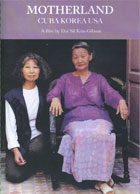
Motherland: Cuba, Korea, USA 2006
Distributed by Women Make Movies, 462 Broadway, New York, NY 10013; 212-925-0606
Produced by Dai Sil Kim-Gibson
Directed by Dai Sil Kim-Gibson
DVD, color, 41 min.
College - Adult
Latin American Studies, Asian Studies, Multicultural Studies
Date Entered: 09/03/2008
Reviewed by Brian Falato, University of South Florida Tampa Campus LibraryDai Sil Kim-Gibson, the producer/director of this video, was born in Korea in 1938 and came to the U.S. in 1962 to attend graduate school. While in Cuba, she met a Cuban woman of Korean ancestry, Martha Lim Kim, who introduced her to other Korean Cubans. Motherland combines their stories with Kim-Gibson’s reflections on her life and the concept of a homeland.
As Martha Lim Kim tells us in Spanish, her grandparents were among 1033 Koreans who immigrated to Mexico in 1905, looking for a better life. But harsh economic conditions there led 300 of them to leave for Cuba in 1921, where most ended up as agricultural laborers, working for little money. When the revolution came in 1959, Martha says, conditions improved for the poor. She was able to go to college and retired as a professor of Marxist philosophy. Other Korean Cubans the director meets also praise the revolution for the improvement in their living conditions and making them finally feel a part of Cuban society, rather than outsiders.
Not all those interviewed are entirely positive in their views on the revolution. Martha’s brother talks about the struggles to live in Cuba because of the scarcity of goods available and says he has lost enthusiasm for socialism. Martha’s sister Carmela, one of several of her relatives now living in the U.S., remembers the discrimination she felt as a child in Cuba and doesn’t feel any attachment to her country of birth.
Director Kim-Gibson narrates the video and reflects on her own life as a Korean American and on the immigrant’s feelings about “home.” Although a United States citizen, she feels increasingly alienated from her adopted home because of the actions of the U.S. government and big business in recent years. She feels an attachment to Cuba because of the Koreans she meets there and the socialist ideal of cooperation for the benefit of all, but recognizes the human rights violations of the Cuban government. At the end of the video, she says, “Home could be and should be the ever growing circle of migrants working together to make every corner of the earth our motherland.”
The mixing of the director’s own story with that of the Korean Cubans doesn’t add anything of substance to the video. But the look at a little-known sub-group of Cubans still makes this video recommended, especially for ethnic studies collections.